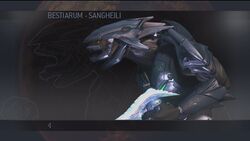Sanghelios: Difference between revisions
From Halopedia, the Halo wiki
No edit summary |
No edit summary |
||
| Line 7: | Line 7: | ||
Most likely due to the fact that Sanghelios has three suns, the surface is dry and arid, although water exists on the planet. The planet as it is illustrated in the [[Beastarium]] indicates that it is similar to [[Earth]], though the landmasses are more scattered in relation to bodies of water. Its atmosphere has a reddish hue to it, like [[Mars]]' atmosphere. | Most likely due to the fact that Sanghelios has three suns, the surface is dry and arid, although water exists on the planet. The planet as it is illustrated in the [[Beastarium]] indicates that it is similar to [[Earth]], though the landmasses are more scattered in relation to bodies of water. Its atmosphere has a reddish hue to it, like [[Mars]]' atmosphere. | ||
Notable places: One of the most prestigious war colleges in the [[Iruiru]] Region of [[Yermo]].<ref>[http://www.bungie.net/News/content.aspx?type=topnews&link=thesoundofsack]</ref> The planet is of course home to a large number of civilian Sangheili, as well as a large defense force (possibly a large fleet). Sanghelios may be the site of large conflict between [[Covenant Separatists|Separatist]] and [[Covenant Loyalists|Loyalist]] forces.<ref>[[Halo 3]], ending cutscene.</ref> | |||
At the end of [[Halo 3]], the [[Arbiter (Character)|Arbiter]], [[Rtas 'Vadum]], and the crew of the carrier ''[[Shadow of Intent]]'' depart for Sanghelios. | |||
==Stats<ref>[[Bestiarum]]</ref>== | |||
{| class="wikitable" | |||
|+'''Bestiarum Statistics''' | |||
|- | |||
| Star, Position: | |||
| Urs (primary), Fied, Joori, IV | |||
|- | |||
| Moons: | |||
| Suban, Quikost | |||
|- | |||
| Population: | |||
| Approximately 8.132 billion Inhabitants | |||
|- | |||
| Temperature: | |||
| -5C to 96C. | |||
|- | |||
| Gravity: | |||
| 1.375 G's | |||
|- | |||
| Atmosphere: | |||
| .9atm ([[Nitrogen|N<sub>2</sub>]], [[Oxygen|O<sub>2</sub>]], [[Argon|Ar]]) | |||
|- | |||
| Societal Approximation: | |||
| Manorialsim/Militant/Patriarchal | |||
|- | |||
| Government: | |||
| Religious Hegemony | |||
|- | |||
| Technology Tier: | |||
| Native Tier 2 | |||
|- | |||
| Current Threat to Array: | |||
| Significant to Serious | |||
|} | |||
==Locations== | ==Locations== | ||
Revision as of 14:23, March 29, 2008
 This article is a stub. You can help Halopedia by expanding it.
This article is a stub. You can help Halopedia by expanding it.
Sanghelios is the homeworld of the Sangheili race. Sanghelios is the fourth planet in a Triple Star System of stars Urs, Fied, and Joori. The planet has two Moons called Qikost and Suban. Many Forerunner artifacts exist on the planet, which are the topic of worship, as well as the cause of historical wars between the Sangheili and the San 'Shyuum before the formation of the Covenant proper.[1]

Background
Most likely due to the fact that Sanghelios has three suns, the surface is dry and arid, although water exists on the planet. The planet as it is illustrated in the Beastarium indicates that it is similar to Earth, though the landmasses are more scattered in relation to bodies of water. Its atmosphere has a reddish hue to it, like Mars' atmosphere.
Notable places: One of the most prestigious war colleges in the Iruiru Region of Yermo.[2] The planet is of course home to a large number of civilian Sangheili, as well as a large defense force (possibly a large fleet). Sanghelios may be the site of large conflict between Separatist and Loyalist forces.[3]
At the end of Halo 3, the Arbiter, Rtas 'Vadum, and the crew of the carrier Shadow of Intent depart for Sanghelios.
Stats[4]
| Star, Position: | Urs (primary), Fied, Joori, IV |
| Moons: | Suban, Quikost |
| Population: | Approximately 8.132 billion Inhabitants |
| Temperature: | -5C to 96C. |
| Gravity: | 1.375 G's |
| Atmosphere: | .9atm (N2, O2, Ar) |
| Societal Approximation: | Manorialsim/Militant/Patriarchal |
| Government: | Religious Hegemony |
| Technology Tier: | Native Tier 2 |
| Current Threat to Array: | Significant to Serious |
Locations
Notable Residents
Etymology
The name "Sanghelios comes from the Latin sang and the Greek helios which mean "Blood-Sun". It is implied that this may refer to the "hot blood" of the warrior race that lives there.